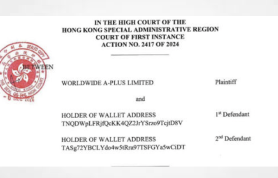MSN
Hong Kong courts can now serve tokenized legal notices on the blockchain against anonymous owners of illicit wallet addresses.
A court injunction order seen by Cointelegraph showed two wallet addresses on Tron that received tokenized legal notices to freeze their assets.
Though previous cases in jurisdictions like the US and UK have showcased courts’ adaptability to novel methods, Hong Kong’s latest tokenized notices differentiate it by preventing ignorance as a defense.
“It will be in violation of criminal law if a transaction follows through, and if centralized exchanges are involved, they would likely be hesitant to engage with these wallets due to their statutory [Anti-Money Laundering and know your blockchain] obligations,” Joshua Chu, cybersecurity consultant at Macro Systems, the tech provider for the tokenized legal notices, told Cointelegraph.
Traditionally, the most common method of serving legal documents is in-person service, where documents are physically handed to the recipient. Some jurisdictions also allow documents to be sent via registered mail, email or fax under certain conditions. In instances where recipients cannot be located, notices have been published in newspapers or online.
“Prior to this, serving court documents on wallet holders has been challenging, if not impossible under existing procedural requirements,” Moses Park, counsel for the plaintiff in the Hong Kong case, told Cointelegraph.
The court injunction allowed for the placement of a digital police tape around the 2.65 million USDT the victim lost in an online scam. Still, by the time the tokenized court orders landed on the suspicious wallets, the suspects had already moved a chunk of the assets, eventually transferring them to exchanges.




